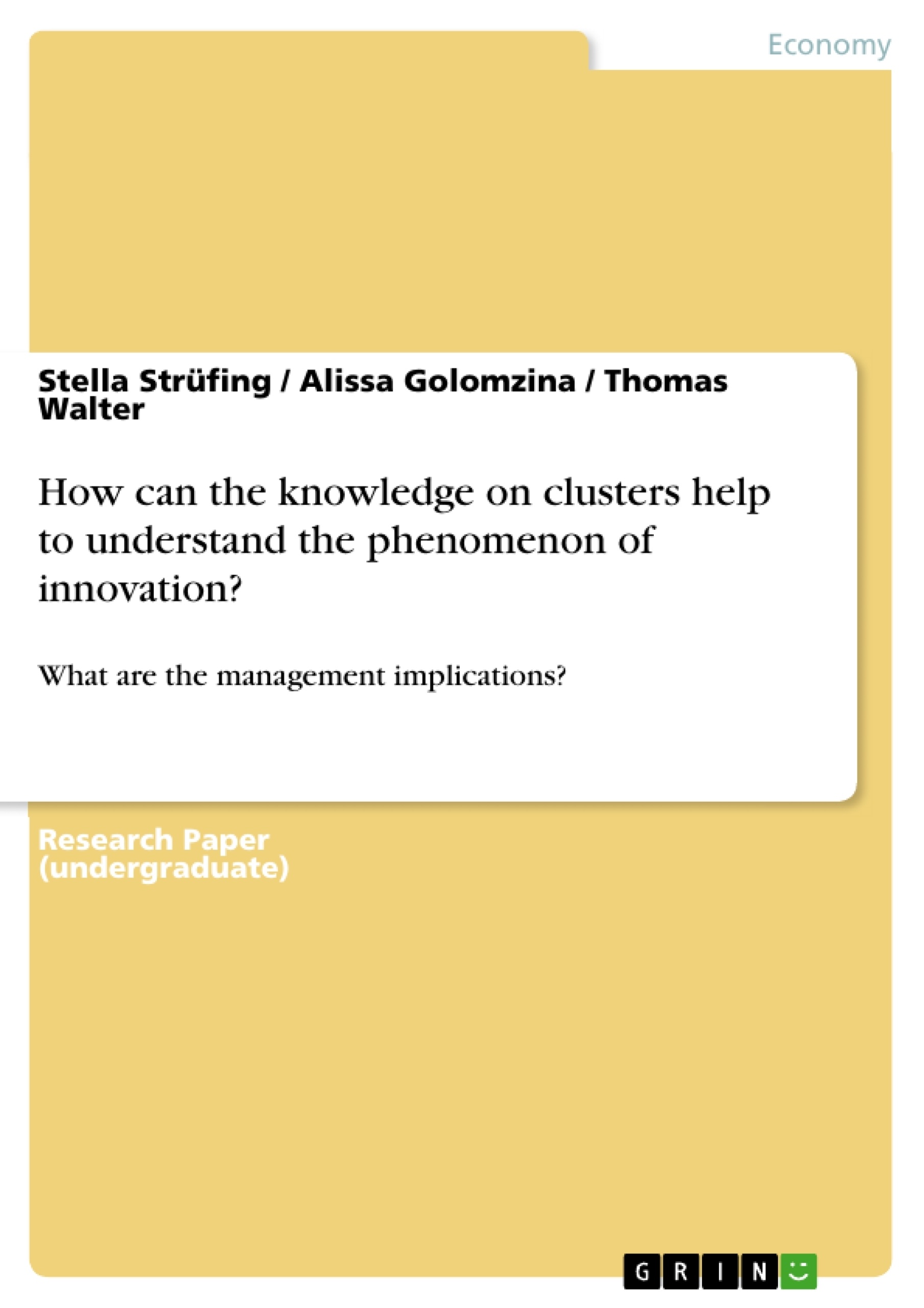Concentration of innovative companies in particular locations and the need to consider clusters in innovation management:
In the current business environment it is remarkable that innovative companies are often concentrated in specific regions. This is true for many industries, however, the probable best known example for such a phenomenon where innovative firms settle close by another is the Silicon Valley. Nevertheless, this is not simply an agglomeration but due to network aspects taking place it is forming a cluster, coming along with several benefits.
These benefits of clusters enhance the firm’s productivity and the firm’s innovation performance, and should therefore be considered in several decision-making processes such as the location choice, innovation output, access to labour and resources.
Considering innovation benefits and their underlying mechanism is particularly important because the technological development cycles and time to market period are becoming increasingly shorter. Respecting the similarities, subsidiaries and interconnectedness inherent in clusters and using them to increase the innovative output to generate a competitive advantage over isolated firms is essential for staying at the top of the market. Understanding the location advantage cluster exhibit is therefore a competitive advantage that will affect a firm and their innovative output.
This paper elaborate the influence of clusters on innovation by explaining clusters in general and in particular concerning innovation benefits and their underlying mechanism and showing how managers can possibly benefit from cluster innovative opportunities.
Inhaltsverzeichnis (Table of Contents)
- Concentration of innovative companies in particular locations and the need to consider clusters in innovation management
- Clusters: definition, benefits and threats
- Clusters are geographic concentrations of interconnected organizations in a particular field, strengthen by input, structure and demand factors
- Benefits of clusters: productivity, innovations & development of new ventures
- Threats of clusters for firms: structure, actor behaviour and geography
- Access to knowledge and speed as key influencing mechanisms explaining innovativeness in clusters
- Clusters give access to accumulated specific knowledge
- Clusters allow to speed up innovation processes
- Management implications: Selecting the location, active participation through competition and cooperation and cluster promotion
- Strategic choice of location is influenced by firm's size, transaction costs, cluster life cycle, innovative capabilities and barriers
- Active participation in cluster combines mechanisms of competition and cooperation
- Bottom-up cluster promotion ensures sustainable development of regional agglomeration
- Clusters can be successfully used to foster innovation and sustain the competitive advantage by giving access to specialized resources, labor and knowledge
Zielsetzung und Themenschwerpunkte (Objectives and Key Themes)
This paper examines the influence of clusters on innovation. It defines clusters and analyzes their benefits and threats. The paper then focuses on how clusters facilitate access to knowledge and accelerate innovation processes. Finally, the paper discusses managerial implications of clusters, including location choice, active participation, and promotion.- The role of clusters in innovation management
- The benefits and challenges of clustering for firms
- The influence of clusters on knowledge access and speed of innovation
- Managerial implications of clusters for firms and regions
Zusammenfassung der Kapitel (Chapter Summaries)
The first chapter introduces the concept of clusters and their importance in innovation management. It highlights how the concentration of innovative companies in specific regions, exemplified by Silicon Valley, fosters innovation through network effects. The chapter also emphasizes the importance of considering clusters in decision-making processes such as location choice, innovation output, and access to labor and resources.
The second chapter delves into the definition of clusters, emphasizing their geographic concentration, interconnectedness, and related organizations. It discusses the key factors influencing cluster formation, including input factors, structure, and demand factors. This chapter also examines the benefits of clusters, such as increased productivity, innovations, and development of new ventures, and explores the potential threats to firms within clusters, such as structure, actor behavior, and geography.
Schlüsselwörter (Keywords)
This paper focuses on clusters, innovation, knowledge management, competitive advantage, and regional development. It examines the impact of clusters on firms and their ability to innovate, highlighting the role of knowledge access and speed of innovation processes within these geographically concentrated networks. The paper also explores the managerial implications of clusters, emphasizing the strategic choice of location, active participation in cluster activities, and the promotion of cluster development.Frequently Asked Questions
What is a cluster in the context of innovation?
Clusters are geographic concentrations of interconnected organizations and companies in a particular field, such as Silicon Valley, which foster innovation through network effects.
How do clusters enhance a firm's innovation performance?
Clusters provide firms with better access to specialized resources, skilled labor, and accumulated specific knowledge, which speeds up the innovation process.
What are the potential threats of being in a cluster?
Threats include issues related to the cluster's structure, the behavior of other actors within the network, and specific geographical disadvantages that may arise over time.
Why is location choice critical for innovative companies?
Choosing a location within a cluster can provide a competitive advantage by shortening time-to-market periods and increasing innovative output compared to isolated firms.
What role does competition and cooperation play within a cluster?
Successful clusters combine mechanisms of both competition and cooperation ("coopetition"), which drives continuous development and regional growth.
- Arbeit zitieren
- Stella Strüfing (Autor:in), Alissa Golomzina (Autor:in), Thomas Walter (Autor:in), 2013, How can the knowledge on clusters help to understand the phenomenon of innovation?, München, GRIN Verlag, https://www.grin.com/document/211100



